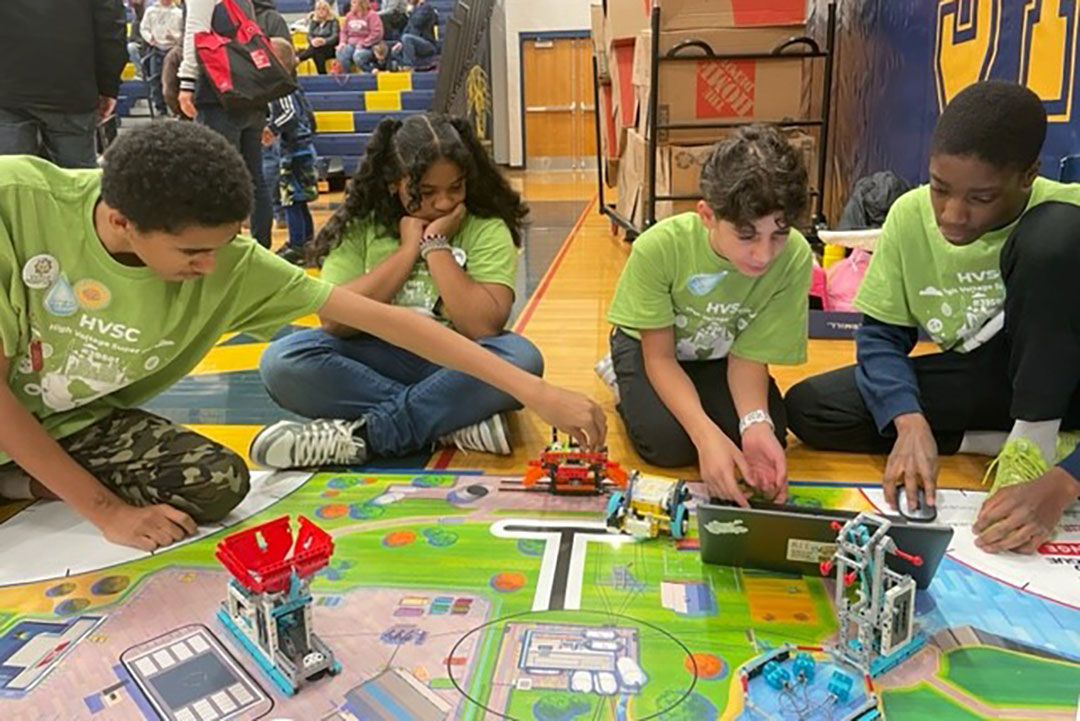STEP's enrichment activities allow local youth to tap into the minds of engineers and scientists with robotics, research
Dana Storti
Middle school students involved with the Science and Technology Entry Program, through the K-12 University Center at RIT, competed in a robotics challenge at Spencerport High School.
For Cole Johnson, working with local youth on some of the hobbies he’s most passionate about happened by coincidence. As a Rochester Institute of Technology second-year computer engineering student, he said he has the opportunity to participate in campus extracurricular activities that involve STEM – science, technology, engineering and math. Through that, Johnson found his way to work with the Science and Technology Entry Program, mentoring middle and high school students involved in robotics.
Most of his efforts are spent during STEAM Saturdays that provide research and robotics experiences for students on weekends throughout the school year. Facilitators from various partnerships on and off RIT’s campus provide interactive workshops, allowing students opportunities to network, and explore different areas of interest and fields of study.
“I got involved with the STEAM Saturday program when I walked into the college robotics room and saw the club trying to fix their robot,” Johnson said. “I was able to help them fix it quickly and they recruited me on the spot.”
Since then, he’s been helping out by teaching students about programming in Java, using Fusion 360 for CAD and designing robot concepts. He comes to the program with an extensive background in robotics, like fellow RIT student Cameron Robinson, who also works as a mentor with the robotics teams through STEP, helping out during STEAM Saturdays with a philosophy to facilitate activities without doing the work for them.
“I try to help the students by providing guidance and information, but never direct answers or outright solutions” said Robinson, a third-year student studying software engineering. “A lot of what I find fun about STEM is the process of problem-solving, so I try to help the students gain the tools and skills necessary to engage in that process for themselves.”
The STEP robotics teams follow curriculum through FIRST – For Inspiration and Recognition of Science and Technology – an international youth organization that oversees various STEM-based educational activities and experiences, robotics challenges and competitions, and more. This year’s STEP teams included students from partnering schools for the FIRST Tech and FIRST LEGO League challenges.
Held at Spencerport High School, both teams ended with mediocre performances, but STEP outreach specialist Dana Storti said students are already working on ideas to improve for next year. She added that while the outcome wasn’t what they hoped, Team High Voltage Super City was presented with the Rising All-Star Award for their attitude, effort and hard work.
“This was a chance for them to display projects they have worked on though research and robotics, and present in front of judges and really take pride in their work,” Storti said.
Competitions are held annually and supported by STEP through its STEAM Saturday events, which includes research and robotics activities during the school year.
According to STEP Director Ashley Simmons, the Research Academy – held in the second half of STEAM Saturdays – helps students prepare for upcoming science fairs. Topics are selected by students, and follow a scientific or engineering design route. Robotics, on the other hand, is connected with FIRST. The middle school team competed in the local FIRST LEGO League competition, while the high school team competed with the FIRST Tech Challenge.
“One of the great things about this is that students from all our partnering schools work with each other and learn from each other, and connect with their peers that they might not have gotten to know before,” Simmons said.
STEP is administered by RIT’s K-12 University Center as one of dozens of locations across the state that offers more than its name implies. As a state-funded precollegiate initiative, it provides outreach for seventh- through 12th-grade students who are underrepresented or from low-income families, but interested in pursuing STEM professions. The goal is to provide afterschool and weekend enrichment activities to help foster academic development, and so students can successfully transition from middle school to high school and high school to college or the workforce. Three outreach specialists and an assistant director also work onsite at various schools in Monroe County, providing in-person services.


